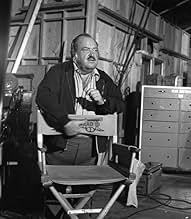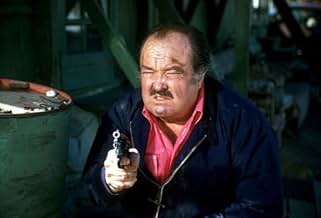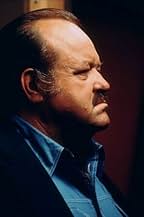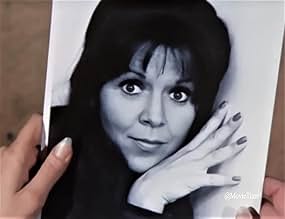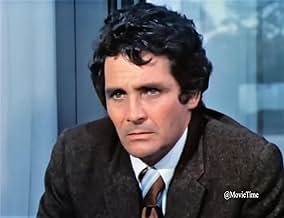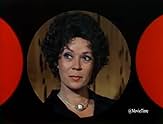Frank Cannon es un expolicía con sobrepeso, calvo, de voz grave y gustos caros en cuanto a placeres culinarios, que se convierte en un investigador privado de alto nivel.Frank Cannon es un expolicía con sobrepeso, calvo, de voz grave y gustos caros en cuanto a placeres culinarios, que se convierte en un investigador privado de alto nivel.Frank Cannon es un expolicía con sobrepeso, calvo, de voz grave y gustos caros en cuanto a placeres culinarios, que se convierte en un investigador privado de alto nivel.
- Nominado para 3 premios Primetime Emmy
- 2 premios y 7 nominaciones en total
Explorar episodios
Reseñas destacadas
Once upon a time you weren't a real TV detetctive unless you had a gimmick; Banacek was Polish, Barnaby Jones was old, Pepper Anderson was a "Police Woman," Ironside was in a wheelchair, Longstreet was blind, McCloud was a cowboy, Kojak was bald, Starsky and Hutch were "cool" (I HATE that word!), Columbo was polite and persistent...
Cannon, who left the force after his wife and child were killed (a plot thread tied up in one of the later episodes), was fat. And like Sammo on "Martial Law" nearly thirty years later, he didn't let his excess avoirdupois hinder his getting results. Unlike Sammo, however, he was hopeless when it came to the rough stuff - watching him get physical is embarrassing, and you suspect he and everyone else involved knew it, which is why hand-to-hand fight scenes were kept to a minimum throughout. (Scenes of him scuba-diving were also kept to a minimum of one episode of the entire run - William Conrad in a wetsuit is not something you want to see.)
The series was more reliant on stories than gimmicks, however, and it was William Conrad's show. No sidekicks, no best buddies, no revolving-door love interests, no down-at-heel stuff for him; he was good value, and so was the series.
Cannon, who left the force after his wife and child were killed (a plot thread tied up in one of the later episodes), was fat. And like Sammo on "Martial Law" nearly thirty years later, he didn't let his excess avoirdupois hinder his getting results. Unlike Sammo, however, he was hopeless when it came to the rough stuff - watching him get physical is embarrassing, and you suspect he and everyone else involved knew it, which is why hand-to-hand fight scenes were kept to a minimum throughout. (Scenes of him scuba-diving were also kept to a minimum of one episode of the entire run - William Conrad in a wetsuit is not something you want to see.)
The series was more reliant on stories than gimmicks, however, and it was William Conrad's show. No sidekicks, no best buddies, no revolving-door love interests, no down-at-heel stuff for him; he was good value, and so was the series.
Why hasn't anyone reproduced this series for sale by season?? I know many people that would buy it as it was a fantastic show. Possibly one of the best series ever. The show had character, and great action. The star William Conrad was so believable. Yet they produce old shows like "I married Joan" from the early 50's and not this one in color from the 70's. I don't understand. This show, CANNON, and The Rockford Files, and Mannix are just not available for sale by anyone that I can find. I have often wondered if someone, the producer or maybe even William Conrad had a rider in their contract that these shows could not be re-sold?? Does anyone know??
"Cannon" was developed by Arthur Hume for Quinn Martin Productions, the same company whose leadership gave us also "The Untouchables" and "Barnaby Jones". This was also one of a bizarre series of what I at the time nominated as "defective detectives". Fortunately for viewers, instead of these series' central characters being ethically defective, like most other compulsives central characters on TV shows they all had a physical or experiential infirmity. One was too young, one was blind, one had a deaf daughter, one had crabgrass, another had an obnoxious girlfriend, Barnaby Jones was old and Frank Cannon, retired ace police detective, carried a lot of weight. He solved cases, worked with aid from and occasionally worked for his old police pals, and used the money he earned so he could buy and eat gourmet food and cook it for his friends in a posh Sunset Strip tower apartment This very-well-made and intelligently scripted series was not devoid of humor either; but William Conrad as "Cannon" was a considerable presence both as actor and large human being. His conviction and strength gave the series a solid boost in quality over other series Also, the employing of several fine guest stars a week added to that quality even more. The scripts for the series were overseen by David Moessinger, Stephen Kandel and Earl Booth. Among the thirty-four credited directors who toiled for the series between 1971-1976 were many first-rate talents, including Richard Donner, Marvin Chomsky, Robert Douglas, E. Arthur Keane, Michael O'Herlihy, Alec MacCowan, Leslie H. Martinson, David Lowell Rich, Jimmy Sangster, Virgil Vogel, David Whorf and Don Taylor. Writers among the nearly six dozen who created episodes for the series included Albert Aley, Margaret Armen, Bill S. Ballinger, Calvin Clements Jr., Harold Gast, Robert Hamner, Leonard Kantor, Robert Lenski, Ken Pettus, Paul Playdon, Jimmy Sangster, Karl Tunberg, Robert Van Scoyk, Phyllis White, Collier Young and Carey Wilber. Arthur Fellows was credited as supervising producer as was Russell Stoneham, with Winston Miller and Paul Playdon contributing also; an unusual feature of the show was how many of its producers and head writers contributed scripts to the series. Music for the series was seldom more than serviceable under seven contributers; Jack Swain did the good straightforward cinematography. The art directors were George B. Chan and Bill Kenney; the very varied set decorations were provided by Carl Biddiscombe and Frank Lombardo. Howard P. Alston was the executive production manager, with Fred Ahern in charge of production, and fine director Kurt Neumann and Lou Place having charge of active production units. John Elizalde was the show's musical supervisor. In one year, 1972, Charles Bateman was regularly featured as a police contact; and the series also used some actors five or more times, including Simon Scott, Arthur Adams, Patrick Culliton and Tom Pittman. Some of the most memorable guest stars on the series included Keith Andes as a charismatic cult leader who had no lines, Charlene Polite as a gorgeous flirtatious woman, and Katherine Justice as a suspicious woman investigating Pernell Roberts. The worst moment of the series? Perhaps it was putting William Conrad into a wetsuit to go scuba diving for evidence. The best? It might have been the brilliant episode "Death is a Doublecross", and much of Alec MacCowan's innovative direction. This is a well-remembered series; its mature star was twice as powerful as an actor and a character because he was not looking for romantic one-nighters everywhere, and because of the show's sheer narrative quality. The best of all private eye shows in TV history, by miles, I assert.
10ramsfan
The great memories of childhood included playing sports and watching television (it was ALWAYS on when I was in the house!!). For my money, the 70's produced the best shows, detective/cop series in particular: Starsky and Hutch, Baretta, Kojak, S.W.A.T. Barnaby Jones, The Rookies etc... And of course "Cannon".The plot has been described already: William Conrad starred as Frank Cannon, a heavyset private detective who took (and invariably solved) cases of interest. Aside from occasional help from his police contacts in gathering information from time to time, Cannon worked alone and relied on intelligence and the occasional gunplay to get things done. Presented in the trademark "Quinn Martin format" of "Acts I, II, III, IV, Cannon was thoroughly enjoyable. The fun in watching today lies in the many great character actors of the day (many of whom appeared on every show of the decade, it seems!), the "sterile" violence and the personal childhood memories the show holds. A great way to spend an hour.
Unlike more recent detective series that are little more than an hour of car chases, graphic bomb scenes and other gratuitous violence, Cannon showed a detective carefully and cleverly going about the business of solving perplexing crimes. Moreover, unlike The Rockford Files and others which strain credibility by portraying a supposedly successful detective as always having trouble paying his bills, Cannon shows a very successful detective surrounded by the trappings of success such as a beautiful Mark IV and an expensive penthouse apartment. All in all a great series.
¿Sabías que...?
- CuriosidadesFrank Cannon was a pipe smoker. He was shown with a pipe in the first two seasons but it was seen occasionally in the third and fourth season before it was subsequently dropped altogether. In reality, William Conrad was a pipe smoker.
- PifiasCannon frequently uses his mobile phone in his car but exterior shots of the car never shows the necessary antenna.
- Citas
[repeated line]
Frank Cannon: My name's Frank Cannon, I'm a private investigator.
- Créditos adicionalesIn all five seasons, the credits are shown in capital and lower case letters.
- ConexionesFeatured in The 25th Annual Primetime Emmy Awards (1973)
Selecciones populares
Inicia sesión para calificar y añadir a tu lista para recibir recomendaciones personalizadas
Detalles
- Fecha de lanzamiento
- País de origen
- Sitio oficial
- Idioma
- Títulos en diferentes países
- Кеннон
- Localizaciones del rodaje
- Empresas productoras
- Ver más compañías en los créditos en IMDbPro
Contribuir a esta página
Sugerir un cambio o añadir el contenido que falta



